Access to my favorite fishing hole is at the end of No-Tell-‘Em Road. You know the road. It's the bumpy, dusty two-track that looks used, but you never actually see anyone using it so you pretend it's yours.
I hike from the end of that road to reach my secret spot. I know the route well so my mind wanders as much as my feet do. I’m here to unravel the knot in my neck. Wading in the river with a fly rod ought to do it.
I'm snacking on jerky as I walk. I see pheasants flush. I smell fishy water. My senses are content. The two-track becomes one and I keep walking with my fly rod in four short pieces so I can pass through tall grass and even taller sagebrush with ease.
When the river sweeps wide, I know I'm close. My fishing hole is just upstream. I look for my treeline turn and that's when I see it. ‘Posted. No trespassing.’
It's posted alright. Posted on, wrapped around and nailed to a fence post. I drop my rod and jiggle the post. Not sure what good that does, but I just need to shake the thing. My senses are no longer content.
My serenity is past the post. I've fished this stretch for as long as I’ve lived here. It's where my old dog Caddis rolled in dead deer in early spring. It's where my husband and I fished the day before we had our first son many falls ago. I bring my dad here when he visits in the summer. I even cross country ski to my spot to wet line in the winter. I need to wade that water for my sanity, but the sign says no go. Some guy doesn’t want to share anymore and now he owns my fishing hole and my memories.
He doesn’t know how many burrs I’ve collected on my coat, and my dog’s, in the brambles around my fishing hole. He doesn’t know about the log my boys stash stones under or the big brown that always bites. He doesn’t know because he isn’t here, but I am. So are my memories.
“Access to private land has and will continue to be an issue in many parts of our state,” says Duston Cureton, Idaho Department of Fish and Game landowner and sportsmen coordinator. “Good sportsmen ethics foster good relationships with landowners. Working together can ensure private land will remain open for hunting and fishing.”
Cureton shepards Idaho’s Access Yes! program in eastern Idaho. The program helps keep land and river access open to sportsman. Many other states from Oregon to Oklahoma have similar programs.
In Idaho, Access Yes! funds come from license fees and a gun tax. Access Yes! has an annual budget of $340,000. That money buys access to more than 474,000 public acres and more than 371,000 private acres statewide.
Sounds impressive, but the signs go up faster than the funds do. That’s why I find myself with slumped shoulders cut off from what I’m after. I feel slapped. The impact of access denied stings my soul instead of my cheek.

Staring at the sign isn't making the sting go away so I turn to leave. Out of habit, I pick up an empty water bottle someone dumped. It's still my resource to protect even if I can't access it anymore.
I also pick up the four pieces of my rod then kick the dirt with my wading boots as that knot in my neck turns into a noose. I never even made it close enough to the water to see which fly I should tie on. Then I realize there are a lot more things I'll never see on my favorite stretch of river. The ‘Keep Out’ sign just changed my history in the making.

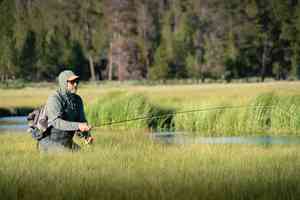
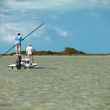

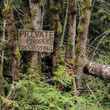


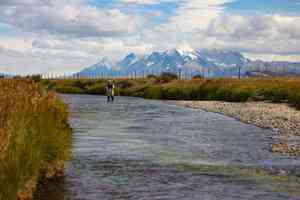


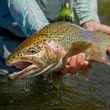

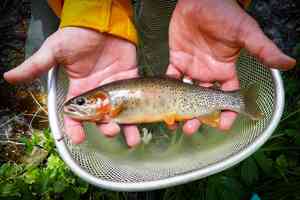


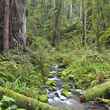




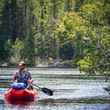
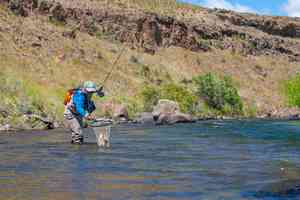




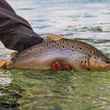

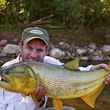
Comments
Tom Panek replied on Permalink
There is always the last resort: find the owner's name. Visit them and ask permission. As secret as your spot may be, it's probably also known to others who don't take care of it the same way you do. Talk with the owner and see what it would take to gain access. Sometimes it's just the courtesy of asking and assuring the owner you'll treat his property as he or she would. It's worth a try. You'll never know if you don't ask. I hope it works. Good luck.
Jake Schwaller replied on Permalink
I learned how to fly fish with my grandfather on the Gallatin River here in MT, and he would always cross a field to get to the spot that he had fished for over 40 years. As he aged, wading up the river became more dangerous, so crossing that field was his only way to get to his spot. When he was 80 years old, a hand for the owner of the property kicked him off, and effectively ended his fly fishing career. I felt like I was reading his story here, and it is such a sad story that is happening far to often anymore. Thank you for telling this.
Jake Klaus replied on Permalink
Damn, this made me mad. I feel your pain, Kris.
Adam B replied on Permalink
I'll bet they'd let you keep fishing. Knock on their door (or look up tax records to find land owner) and as for permission. Has worked for me 9 out of 10. People really appreciate it and are friendly. This approach helps all of us in the long run. Good luck
Joseph Youren replied on Permalink
Access to fishing and hunting opportunities are, to me, the biggest reason to resist all attempts to turn over federal lands to the states. States do not have the long term determination to protect and manage these lands in times of economic stress. The pressure to sell or deal them away is too great. When public lands are no longer public - get used to "No Trespass" signs.
Pages